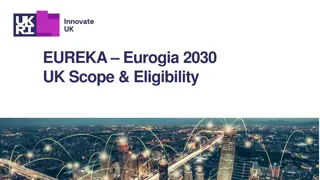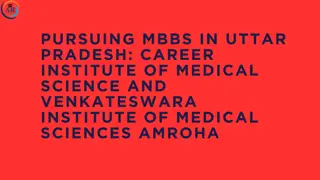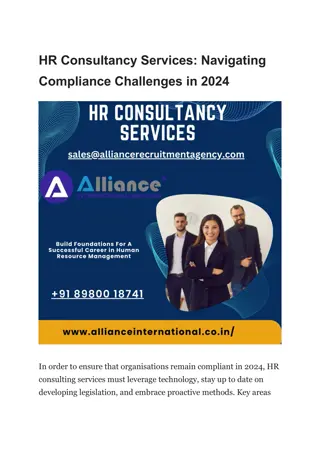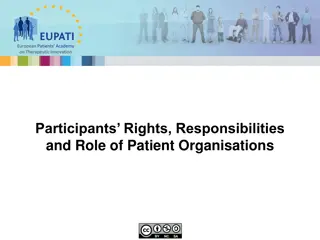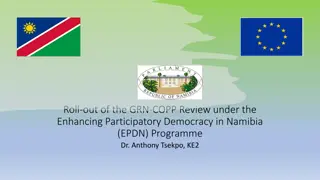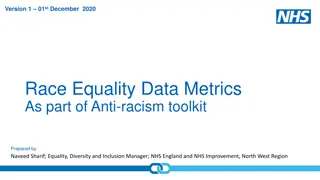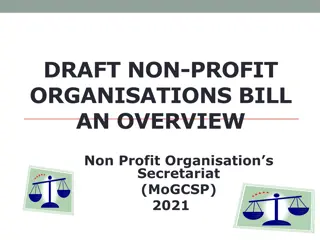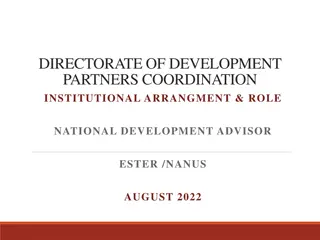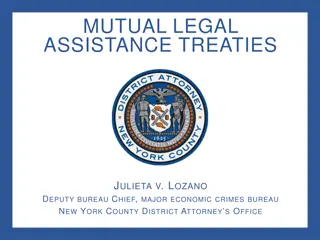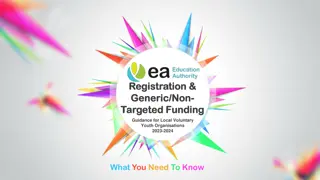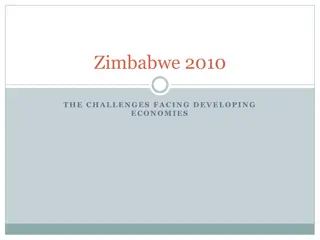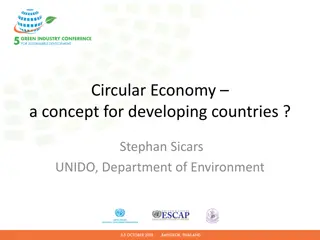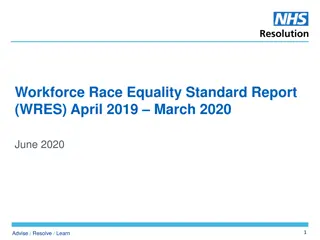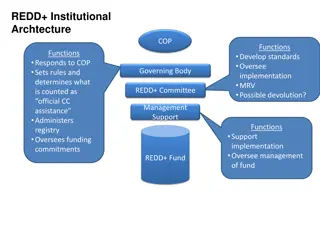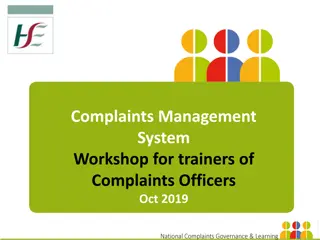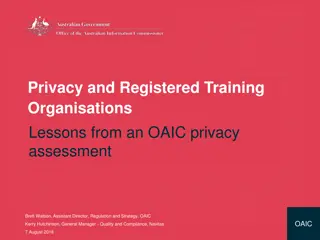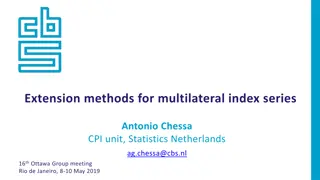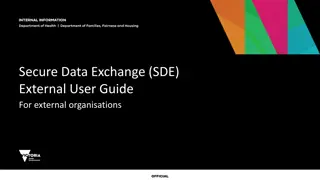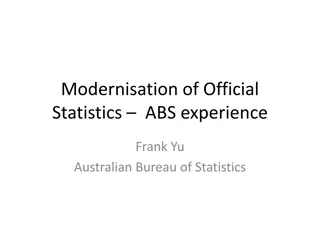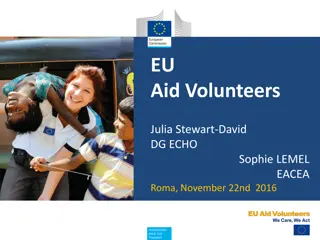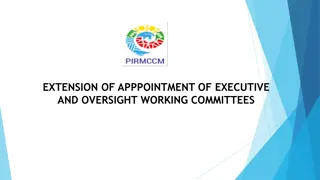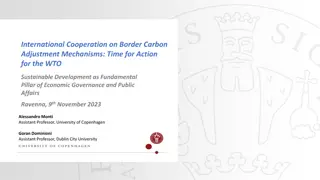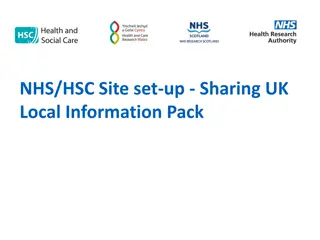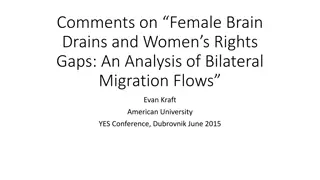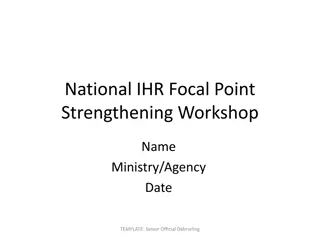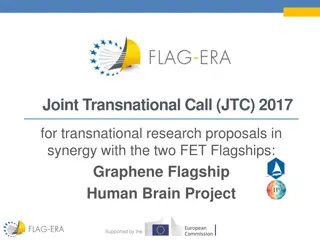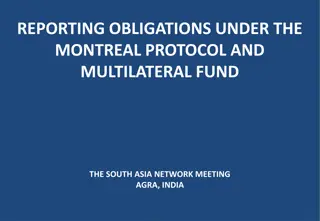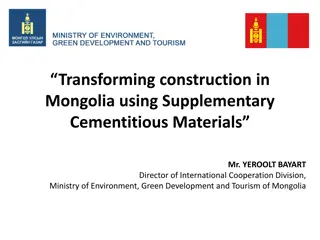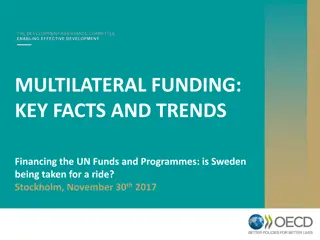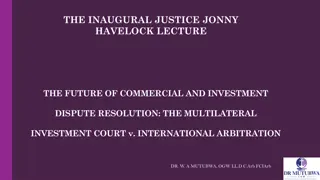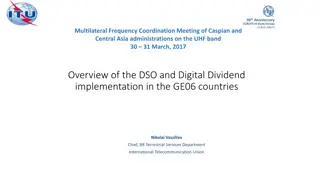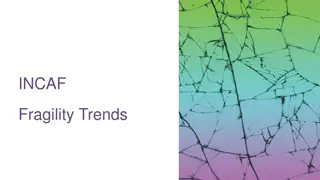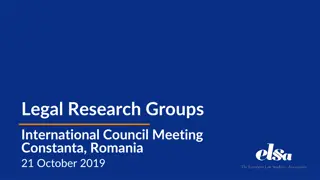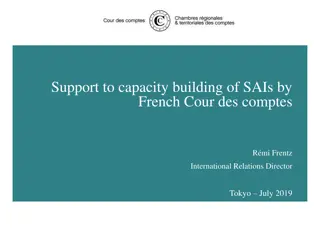World Bank group
The World Bank Group comprises five key institutions, each serving specific functions to support international development and financial assistance. These institutions include the International Bank for Reconstruction and Development (IBRD), the International Development Association (IDA), the Inter
4 views • 7 slides
The National Lottery Community Fund
The National Lottery Community Fund, led by Funding Officer Jenny Fish, distributes millions to UK communities yearly. Focused on supporting ideas that matter, strengthening relationships, and addressing challenges like the cost of living crisis. Open to diverse organisations, the fund aims to help
1 views • 15 slides
UK Scope & Eligibility for EUREKA Eurogia 2030
Innovate UK, as a member country of the Eureka network, offers funding opportunities for UK organisations to engage in international collaboration in R&D&I. The participation can help in scaling up international collaboration efforts, aligning with the UK's Innovation Strategy. UK applicants can app
1 views • 5 slides
How to Choose the Right MBBS College in Uttar Pradesh
The interest of a medical degree in India could be a thorough, however fulfilling travel, particularly when attempted at prestigious institutions that offer strong educational programs, state-of-the-art offices, and comprehensive clinical preparation. In Uttar Pradesh, the Career Institute of Medica
1 views • 5 slides
HR Consultancy Services Navigating Compliance Challenges in 2024
In order to ensure that organisations remain compliant in 2024, HR consulting services must leverage technology, stay up to date on developing legislation, and embrace proactive methods. Key areas and tactics that HR consulting services ought to concentrate on are as follows:\n\n
0 views • 5 slides
Understanding Participant Rights, Responsibilities, and the Role of Patient Organisations in Clinical Trials
Participants in clinical trials have specific rights that are protected by law, including the right to informed consent and the right to be informed of any new benefits, risks, or side effects discovered during a study. They also have responsibilities such as adhering to the prescribed medication sc
0 views • 8 slides
Enhancing Participatory Democracy in Namibia: EPDN Programme Review
The EPDN Programme aims to enhance participatory democracy in Namibia by strengthening collaboration between Civil Society Organizations, Government, and Parliament in education, skills, and rural development sectors. Specific tasks include assisting in the implementation of the Civic Organisations
0 views • 8 slides
Race Equality Data Metrics & Key Indicators in Workplace: An Anti-racism Toolkit
Race Equality Data Metrics & Key Data Indicators play a crucial role in assessing workplace race equality. Developed by Naveed Sharif, this toolkit provides 6 essential metrics focusing on leadership, recruitment, and formal workplace processes. The toolkit aims to address disparities and promote eq
2 views • 11 slides
REDD+ Financing: Meeting Standards and Funding Needs
Explore the world of REDD+ financing, from accessing funds to meeting standards and securing necessary capital. Learn about the estimated extent of capital needed and projected financing needs in the quest to reduce emissions from the forest sector. Discover the role of private finance and multilate
0 views • 17 slides
Overview of Non-Profit Organisations Bill and Historical Background in Ghana
The article provides an in-depth overview of the Non-Profit Organisations (NPO) Bill in Ghana, highlighting its importance as a tool for development. It covers the challenges faced in the past regarding NPO regulation and outlines the historical background leading to the creation of the NPO Secretar
0 views • 27 slides
Directorate of Development Partners Coordination and its Role in National Development - August 2022
The Directorate of Development Partners Coordination plays a crucial role in mobilizing, coordinating, and managing development support to enhance local public resources and complement domestic efforts. Through partnerships with various bilateral and multilateral development partners, the Directorat
0 views • 12 slides
Overview of Mutual Legal Assistance Treaties in Criminal Matters
Mutual Legal Assistance Treaties (MLATs) play a crucial role in facilitating international cooperation in criminal investigations and proceedings. They allow for the exchange of evidence, documents, and other forms of legal assistance between countries. MLATs come in various types, such as bilateral
0 views • 13 slides
Guidance for Local Voluntary Youth Organisations Applying for Funding 2023-2024
Discover the steps and requirements for local voluntary youth organisations seeking funding in 2023-2024. Learn about generic/non-targeted funding, eligibility criteria, application stages, and funding utilization. Access the Education Authority's funding portal and navigate the registration and app
1 views • 24 slides
Challenges Faced by Developing Economies in Post-Conflict Zones
Addressing the economic, social, and security challenges in developing economies post-conflict, including issues such as aid effectiveness, resource dependency, governance, and civil wars. The importance of foreign investment, multilateral cooperation, and possible solutions to foster economic growt
0 views • 20 slides
Circular Economy as an Opportunity for Developing Countries
Circular economy presents an opportunity for developing countries to generate wealth, reduce environmental footprint, and promote sustainable practices. By extending product lifetimes, reusing resources, and minimizing waste, developing nations can benefit from economic interests while complementing
0 views • 9 slides
NHS Workforce Race Equality Standard (WRES) Report Summary 2019/2020
The NHS mandated the Workforce Race Equality Standard (WRES) in 2015 to address race inequality in healthcare. This report highlights key findings for 2019/2020, comparing them to the previous year, focusing on the nine WRES indicators. Organisations use these indicators to enhance experiences and o
0 views • 15 slides
REDD+ Institutional Architecture and Functions Overview
This content discusses the institutional architecture and functions of REDD+ (Reducing Emissions from Deforestation and Forest Degradation). It covers the role of key bodies like the COP, governing bodies, committees, and funds in developing standards, overseeing implementation, managing support fun
0 views • 5 slides
Comprehensive Training Workshop on Complaints Management System Benefits and Implementation
Explore the importance of using the CMS to enhance patient safety, improve healthcare provision, and facilitate systematic analysis of patient complaints. Learn how a standardised information system can identify trends, support quality assurance, and streamline the complaints process. Discover the k
0 views • 28 slides
Privacy and Registered Training Organisations: Lessons and Insights
Learn about privacy assessments conducted by the OAIC on Registered Training Organisations (RTOs) in collaboration with Navitas. Discover the legal frameworks, scope, and methodology of these assessments, along with tips for good privacy practices. Explore the findings, areas for improvement, and le
1 views • 30 slides
Salesforce consultant roles and responsibilities
In today\u2019s changing business landscape, driving a company toward success needs more than a robust business model. It usually depends on an in-depth understanding of the technologies that operate business organisations and foster customer relatio
0 views • 7 slides
Extension Methods for Multilateral Index Series: A Comparative Study by Antonio Chessa
This study by Antonio Chessa delves into the characterization of extension methods for multilateral index series, highlighting the impact of various factors such as product definition, index formula, weighting schemes, and length of time windows on the index. It addresses the challenges of revising
0 views • 33 slides
Guide to Secure Data Exchange (SDE) for External Organisations
This guide provides step-by-step instructions on accessing and using the Secure Data Exchange (SDE) platform for securely exchanging data between departments and external users. It covers creating a Microsoft account, uploading and downloading files, frequently asked questions, support requests, sit
0 views • 12 slides
The Modernisation of Official Statistics: Challenges and Goals
Modernising official statistics is essential for organisations like the Australian Bureau of Statistics to meet the challenges posed by big data, changing expectations, and limited resources. The ABS aims to reduce business costs, introduce new statistical products/services, and successfully execute
0 views • 28 slides
EU Aid Volunteers Certification and Application Process
Explore the EU Aid Volunteers program certification mechanism and detailed application requirements for sending and hosting organisations. Learn about the administrative simplification for certain partners and what constitutes a complete application. Understand the evidence-based self-assessment for
0 views • 18 slides
Extension of Appointment and Membership in Executive and Oversight Working Committees
The extension and members of the Executive Committee and Oversight Working Group are detailed, including representatives from various sectors such as CSO, government, multilateral organizations, and more. The Oversight Working Group includes members representing different constituencies like PLWD an
0 views • 7 slides
International Cooperation on Carbon Border Adjustment Mechanisms for Sustainable Development
Discussion on the importance of international cooperation in implementing carbon border adjustment mechanisms to address embedded emissions in global trade and promote sustainable development. The presentation highlights the need for multilateral collaboration, the role of WTO in climate and trade r
0 views • 12 slides
Sharing UK Local Information Pack with NHS/HSC Organisations
This presentation provides an overview of sharing the UK Local Information Pack with NHS/HSC organizations, including its purpose, how to share it, and the components of non-commercial and commercial packs. The pack aims to facilitate research studies by maintaining compatible systems across the UK,
0 views • 12 slides
Contemporary Challenges in Nuclear Disarmament and Non-Proliferation Regime
The international regime for nuclear disarmament and non-proliferation faces challenges from states within and outside the regime, as well as non-state actors. Various approaches are being utilized to address these challenges, including strengthening multilateral institutions, non-treaty-based multi
0 views • 12 slides
Analysis of Female Brain Drains & Women's Rights Gaps in Bilateral Migration Flows
Observations show women migrate more than men, affected by factors like family reunification. Skilled women migrate more than skilled men, contributing to brain drain. Research examines impact of women's rights gap on female brain drain ratio using a non-linear model, indicating a complex relationsh
0 views • 8 slides
Pan American Health Organization / World Health Organization Multilateral IHR NFP Strengthening Workshop Toolkit
This toolkit serves as a guide for strengthening International Health Regulations National Focal Points, focusing on aligning procedures, promoting cooperation, enhancing communication, and developing collaborative activities. It includes objectives, mission activities, findings, recommendations, mi
0 views • 8 slides
Joint Transnational Call (JTC) 2017 in Synergy with FET Flagships: Overview & Opportunities
The Joint Transnational Call (JTC) 2017, facilitated by FLAG-ERA, aligns transnational research proposals with the Graphene Flagship and Human Brain Project under the FET Flagships initiative. FLAG-ERA provides a framework for collaboration among National Organisations in Europe and beyond, supporte
0 views • 12 slides
Reporting Obligations Under the Montreal Protocol and Multilateral Fund
This informative content focuses on the reporting obligations under the Montreal Protocol and Multilateral Fund, highlighting data reporting under Article 7, submission requirements, differences between Article 7 and Country Programme reporting, and details on when and how to submit data. It also di
0 views • 19 slides
Revolutionizing Construction in Mongolia through Sustainable Cement Solutions
Innovatively transforming Mongolia's construction sector by integrating supplementary cementitious materials (SCM) to reduce carbon emissions, with a focus on recycling fly ash from coal-fired power plants. The National Action Programme on Climate Change (NAPCC) aligns with the project, aiming to mi
0 views • 5 slides
Multilateral Funding Trends and Impacts on Global Development
Understanding the shifts in multilateral funding for UN Funds and Programmes is crucial for assessing its impact. Analysis shows a decrease in funding to multilateral organisations, with earmarked funding on the rise. The role of multilateral organisations in reducing global poverty and promoting eq
0 views • 24 slides
The Future of Commercial and Investment Dispute Resolution: The Multilateral Investment Court vs. International Arbitration
International dispute resolution systems, particularly arbitration, face challenges like cost and time efficiency. The Multilateral Investment Court (MIC), proposed by the EU, aims to replace traditional ISDS systems and provide a permanent multilateral court for investment disputes. The MIC incorpo
0 views • 16 slides
Overview of Multilateral Frequency Coordination Meeting for Digital Dividend Implementation
The Multilateral Frequency Coordination Meeting discussed progress in implementing digital switchover and digital dividend in the GE06 countries. It highlighted the allocation of spectrum for mobile services and the importance of coordinated implementation. Various coordination groups in Region 1 wo
0 views • 14 slides
Trends in Fragility: Challenges and Commitments in INCAF Network
The International Network on Conflict and Fragility (INCAF), a member of the OECD Development Assistance Committee, addresses the complex issues of delivering results in fragile contexts. By 2030, a significant population will reside in fragile settings, highlighting the urgency for action. INCAF ex
0 views • 14 slides
Exploring Legal Research Groups: Types, Differences, and Developments
Delve into the world of Legal Research Groups (LRGs) through an overview of their types - unilateral, bilateral, multilateral, and international, alongside distinguishing them from the ELSA Law Review. Explore the history of LRGs and recent topics such as Renewable Energy. Learn about challenges fac
0 views • 17 slides
French SAI Support for Capacity Building in Developing Countries
The French Cour des comptes is dedicated to supporting the capacity building of Supreme Audit Institutions (SAIs) in developing countries. They emphasize independence, professional standards, and jurisdictional functions in their assistance. Through multilateral organizations and bilateral cooperati
0 views • 16 slides
Global Agricultural Trade Trends and the Impact on U.S.-China Relations
Amidst a rollercoaster decade of global trade dynamics, the U.S.-China agricultural trade relationship has faced challenges and fluctuations. From the Great Recession to trade wars and the pandemic, trade patterns have shifted significantly, influencing agricultural trade growth. The presentation di
0 views • 23 slides


